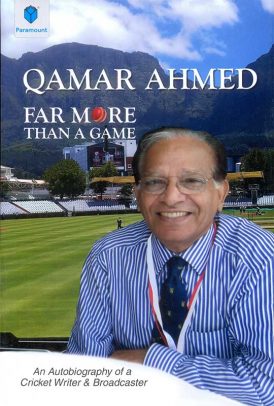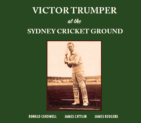Far More Than A Game
Martin Chandler |Published: 2023
Pages: 236
Author: Ahmed, Qamar
Publisher: CricketMASH
Rating: 4 stars

I have seen Qamar Ahmed’s byline on a number of occasions, and I have a few books that he was involved in. One, which carries his name as author, is an account of the Pakistan/West Indies series in the Caribbean in 1993. The others are a couple of autobiographies that he ghosted, those of two of Pakistan’s earliest Test cricketers, Hanif Mohammad and Waqar Hasan.
So I knew that Qamar was a cricket writer, but nothing beyond that. Cricket writers have been known to write autobiographies of their own. Two of the most illustrious to have done so are EW ‘Jim’ Swanton and John Arlott, but neither managed to produce a compelling read. To those can be added a number of other names, Robertson-Glasgow, Martin-Jenkins, and Cardus to mention three with lofty reputations, none of whose autobiographies are amongst their finest moments. Two exceptions, that perhaps prove the rule, are David Frith and Stephen Chalke.
I must admit to not having opened Far More Than A Game with much in the way of expectation, which just goes to show how wrong you can be. The life of Qamar Ahmed is an interesting one, and not simply because of his long involvement in cricket or the fact that he has been fortunate enough to have been able to earn a living from watching and writing about the sport he clearly loves.
Qamar was born in Bihar in India in 1937. His story begins with an account of a happy childhood in a peaceful multi ethnic community. Last year marked the 75th anniversary of the partition of India in 1947 and an event from history that I had always wanted to know more about was the subject of a number of articles and television documentaries here in the UK. I have to say though that none of them hit the spot in quite the same way as Qamar’s account. Perhaps his story is all the better for his having lived through the trauma of the times, and by virtue of the fact that despite his journalistic skills he has never been a political animal. Whatever the reasons he tells a compelling story.
Something I had certainly not realised about Qamar was that he was a decent cricketer himself, primarily a left arm spinner, but a useful batsman as well. Qamar appeared in as many as 17 First Class matches before he left Pakistan for England in 1964 and was still sufficiently highly thought of by Pakistan team manager Intikhab Alam to be called from the press box to the nets in Australia twenty years later in 1984.
Coming from a family of scientists the young Qamar seems to have struggled to find his niche in Pakistan, hence his travelling to the UK in 1964. His account of his early days in England are illuminating, although I have to question one or two of his assertions, most particularly that the social security payments he was entitled to on his arrival in the country matched the average weekly wage of the time.
It took Qamar more than a decade to finally get enough work to be able to concentrate on his journalistic career, something which led him into broadcasting as well. He has therefore had the best seat in the house for much of the cricket that has been played in his lifetime, and he is therefore able to concentrate his narrative on the interesting and controversial moments he has witnessed, his take on the infamous clash between Mike Gatting and Shakoor Rana being a highlight.
Qamar comes across as a kind and generous man, qualities which make it all the more admirable that he has succeeded in a world that can certainly be competitive. One story I particularly enjoyed involved the lengths he went to in New Zealand to assist a man he did not know to persuade the Indian team led by Mohammad Azharuddin to bring his players to his home, even going so far as to unwittingly find himself being admonished by local police for not following local butchery regulations.
The accounts of dealings with some celebrated characters are unfailingly positive even when describing a not always easy relationship with Imran Khan. There is none of the sort of score settling that autobiographies sometimes indulge in, and even in the chapter on Saleem Malik the dominant emotion is, rather than a rush to an angry judgment, simply an expression of sadness at the manner in which such a talented cricketer allowed his reputation to be sullied.
Qamar Ahmed’s autobiography is an excellent read, and publishers CricketMASH are to applauded once more for bringing a book that would otherwise be difficult to obtain to a wider audience.






Leave a comment